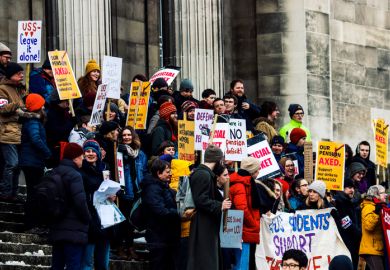The University of London has said it will end the outsourcing its staff, the subject of long-running protests and boycotts at the institution.
In a statement, the university said the board of trustees had “agreed to the vice-chancellor’s proposal to support the principle of insourcing staff”.
Outsourcing of personnel has been a long-running issue for the University of London, and has resulted in protests and a number of occupations and boycotts of the university’s headquarters at Senate House.
Activists say the outsourced staff suffer from worse pay and working conditions than those who are directly employed by the university. These workers, the majority of whom are ethnic minority or migrant workers, receive reduced holiday and sick pay and pension contributions.
Earlier this year, The Guardian revealed that in 2018, the university had spent more than £1.3 million on additional security officers, receptionists and other security measures in response to student protests and staff strikes.
In a statement, the university said that it would consult with trade unions and staff representatives to insource security staff and cleaners. Earlier this year, the institution continued, it had begun insourcing receptionists, porters, post room and audiovisual staff.
The university also said that the board had agreed to contract estate maintenance services to a new supplier “due to the nature of the university’s historic estate and the technical skills required”.
The university’s vice-chancellor, Wendy Thomson, who took up the role in July, said her arrival provided “an opportunity for the university to clarify its position”.
“The strength of feeling within the university community, the undertakings that have been given to staff and the financial position shaped my view, together with the potential harm of the boycott to staff and the events organised by the university, and the positions being adopted on this issue by other institutions in the higher education sector,” Professor Thomson said.
“There are also unplanned costs and inconvenience associated with additional security required to manage in these circumstances. Clearly, we need to support insourcing in principle and begin to take practical measures to achieve that where possible.”
Register to continue
Why register?
- Registration is free and only takes a moment
- Once registered, you can read 3 articles a month
- Sign up for our newsletter
Subscribe
Or subscribe for unlimited access to:
- Unlimited access to news, views, insights & reviews
- Digital editions
- Digital access to THE’s university and college rankings analysis
Already registered or a current subscriber?




